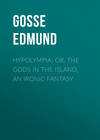Kitabı oku: «Raleigh», sayfa 8
It has been supposed that Raleigh was a complete loser by these vain expeditions. But a passage in a letter of August 21, 1602, shows us that this was not the fact. He says: 'Neither of them spake with the people,' that is, with the lost Virginian colonists, 'but I do send both the barques away again, having saved the charge in sassafras wood.' From the same letter we find that Gilbert and Gosnoll went off without Raleigh's leave, though in his ship and at his expense, and the latter therefore prays that his nephew may be stripped of his rich store of sassafras and cedar wood, partly in chastisement, but more for fear of overstocking the London market. He throws Gilbert over, and speaks angrily of him not as a kinsman, but as 'my Lord Cobham's man;' then relents in a postscript – 'all is confiscate, but he shall have his part again.'
Raleigh was feeble in health and irritable in temper all this time. Lady Raleigh, with a woman's instinct, tried to curb his ambition, and tie him down to Sherborne. 'My wife says that every day this place amends, and London, to her, grows worse and worse.' Meanwhile, there is really not an atom of evidence to show that Raleigh was engaged in any political intrigue. He spent the summer and autumn of 1602, when he was not at Sherborne, in going through the round of his duties. All the month of July he spent in Jersey, 'walking in the wilderness,' as he says, hearing from no one, and troubled in mind by vague rumours, blown over to him from Normandy, of the disgrace of the Duc de Biron. He is also 'much pestered with the coming of many Norman gentlemen, but cannot prevent it.' On August 9, he left Jersey, in his ship the 'Antelope,' fearing if he stayed any longer to exhaust her English stores, and get no more 'in this poor island.' On landing at Weymouth on the 12th, he wrote inviting Cecil and Northumberland to meet him at Bath. He was justly exasperated to find that during his absence Lord Howard of Bindon had once more taken up the wicked steward, Meeres, and persuaded Sir William Peryam, the Chief Baron of the Exchequer, to try the suit again. Raleigh complains to Cecil:
I never busied myself with the Lord Viscount's [Lord Bindon's] wealth, nor of his extortions, nor poisoning of his wife, as is here avowed, have I spoken. I have foreborne … but I will not endure wrong at so peevish a fool's hands any longer. I will rather lose my life, and I think that my Lord Puritan Peryam doth think that the Queen shall have more use of rogues and villains than of men, or else he would not, at Bindon's instances, have yielded to try actions against me being out of the land.
The vexation was a real one, but this is the language of a petulant invalid, of a man to whom the grasshopper has become a burden. We are therefore not surprised to find him at Bath on September 15, so ill that he can barely write a note to Cecil warning him of the approach of a Spanish fleet, the news of which has just reached him from Jersey. He grew little better at Bath, and in October we find him again at Sherborne, in very low spirits, sending by Cobham to the Queen a stone which Bartholomew Gilbert had brought from America, and which Raleigh took to be a diamond. Immediately after this, he set out on what he calls his 'miserable journey into Cornwall,' no other than his customary autumn circuit through the Stannary Courts. Once he had enjoyed these bracing rides over the moors, but his animal spirits were subdued, and the cold mosses, the streams to be forded, the dripping October woods, and the chilly granite judgment-seat itself, had lost their attraction for his aching joints. In November, however, he is back at Sherborne, restored to health, and intending to linger in Dorsetshire as long as he can, 'except there be cause to hasten me up.'
Meanwhile he had paid a brief visit to London, and had spoken with the Queen, as it would appear, for the last time. Cecil, who was also present, has recorded in a letter of November 4 this interview, which took place the previous day. On this last occasion Elizabeth sought Raleigh's advice on her Irish policy. The President of Munster had reported that he had seen fit to 'kill and hang divers poor men, women, and children appertaining' to Cormac MacDermod McCarthy, Lord of Muskerry, and to burn all his castles and villages from Carrigrohan to Inchigeelagh. Cecil was inclined to think that severity had been pushed too far, and that the wretched Cormac might be left in peace. But Elizabeth had long been accustomed to turn to Raleigh for advice on her Irish policy. He gave, as usual, his unflinching constant counsel for drastic severity. He 'very earnestly moved her Majesty of all others to reject Cormac MacDermod, first, because his country was worth her keeping, secondly, because he lived so under the eye of the State that, whensoever she would, it was in her power to suppress him.' This last, one would think, might have been an argument for mercy. The Queen instructed Cecil to tell Sir George Carew, that whatever pardon was extended to others, none might be shown to Cormac.
It was in the same spirit of rigour that Raleigh had for two years past advised the retention of the gentle and learned Florence MacCarthy in the Tower, as 'a man reconciled to the Pope, dangerous to the present State, beloved of such as seek the ruin of the realm;' and this at the very time when MacCarthy, trusting in his twenty years' acquaintance with Raleigh, was praying Cecil to let him be his judge. Raleigh little thought that the doors which detained Florence MacCarthy would soon open for a moment to inclose himself, and that in two neighbouring cells through long years of captivity the History of the World would grow beside the growing History of the Early Ages of Ireland.
In this year, 1602, Raleigh parted with his vast Irish estates to Richard Boyle, afterwards Earl of Cork, and placed the purchase-money in privateering enterprises. It is known that Cecil had an interest in this fleet of merchantmen, and as late as January 1603 he writes about a cruiser in which Raleigh and he were partners, begging Raleigh, from prudential reasons, to conceal the fact that Cecil was in the adventure. There was no abatement whatever in the friendliness of Cecil's tone to Raleigh, although in his own crafty mind he had decided that the death of the Queen should set the term to Raleigh's prosperity. On March 30, 1603, Elizabeth died, and with her last breath the fortune and even the personal safety of Raleigh expired.
We may pause here a moment to consider what was Raleigh's condition and fame at this critical point in his life. He was over fifty years of age, but in health and spirits much older than his time of life suggested; his energy had shown signs of abatement, and for five years he had done nothing that had drawn public attention strongly to his gifts. If he had died in 1603, unattainted, in peace at Sherborne, it is a question whether he would have attracted the notice of posterity in any very general degree. To close students of the reign of Elizabeth he would still be, as Mr. Gardiner says, 'the man who had more genius than all the Privy Council put together.' But he would not be to us all the embodiment of the spirit of England in the great age of Elizabeth, the foremost man of his time, the figure which takes the same place in the field of action which Shakespeare takes in that of imagination and Bacon in that of thought. For this something more was needed, the long torture of imprisonment, the final crown of judicial martyrdom. The slow tragedy closing on Tower Hill is the necessary complement to his greatness.
All this it is easy to see, but it is more difficult to understand what circumstances brought about a condition of things in which such a tragedy became possible. We must realise that Raleigh was a man of severe speech and reserved manner, not easily moved to be gracious, constantly reproving the sluggish by his rapidity, and galling the dull by his wit. All through his career we find him hard to get on with, proud to his inferiors, still more crabbed to those above him. If policy required that he should use the arts of a diplomatist, he overplayed his part, and stung his rivals to the quick by an obsequiousness in speech to which his eyes and shoulders gave the lie. With all his wealth and influence, he missed the crowning points of his ambition; he never sat in the House of Peers, he never pushed his way to the council board, he never held quite the highest rank in any naval expedition, he never ruled with only the Queen above him even in Ireland. He who of all men hated most and deserved least to be an underling, was forced to play the subordinate all through the most brilliant part of his variegated life of adventure. It was only for a moment, at Cadiz or Fayal, that by a doubtful breach of prerogative he struggled to the surface, to sink again directly the achievement was accomplished. This soured and would probably have paralysed him, but for the noble stimulant of misfortune; and to the temper which this continued disappointment produced, we must look for the cause of his unpopularity.
It is difficult, as we have said, to understand how it was that he had the opportunity to become unpopular. From one of his latest letters in Elizabeth's reign we gather that the tavern-keepers throughout the country considered Raleigh at fault for a tax which was really insisted on by the Queen's rapacity. He prays Cecil to induce Elizabeth to remit it, for, he says, 'I cannot live, nor show my face out of my doors, without it, nor dare ride through the towns where these taverners dwell.' This is the only passage which I can find in his published correspondence which accounts in any degree for the fact that we presently find Raleigh beyond question the best-hated man in England.8
CHAPTER VII.
THE TRIAL AT WINCHESTER
Raleigh was in the west when the Queen died, and he had no opportunity of making the rush for the north which emptied London of its nobility in the beginning of April. King James had reached Burghley before Raleigh, in company with his old comrade Sir Robert Crosse, met him on his southward journey. It was necessary that he should ask the new monarch for a continuation of his appointments in Devon and Cornwall; his posts at Court he had probably made up his mind to lose. One of the blank forms which the King had sent up to be signed by Cecil, nominally excusing the recipient from coming to meet James, had been sent to Raleigh, and this was of evil omen. The King received him ungraciously, and Raleigh did not make the situation better by explaining the cause of his disobedience. James, it is said, admitted in a blunt pun that he had been prejudiced against the late Queen's favourite; 'on my soul, man,' he said, 'I have heard but rawly of thee.' Raleigh was promised letters of continuance for the Stannaries, but was warned to take no measures with regard to the woods and parks of the Duchy of Cornwall until further orders. After the first rough greeting, James was fairly civil, but on April 25 privately desired Sir Thomas Lake to settle Raleigh's business speedily, and send him off.
In the first week of May, Sir Walter Raleigh was informed by the Council that the King had chosen Sir Thomas Erskine to be Captain of the Guard. It was the most natural thing in the world that James should select an old friend and a Scotchman for this confidential post, and Raleigh, as the Council Book records, 'in a very humble manner did submit himself.' To show that no injury to his fortunes was intended, the King was pleased to remit the tax of 300l. a year which Elizabeth had charged on Raleigh's salary as Governor of Jersey. There does not seem to be any evidence that Raleigh was led into any imprudent action by all these changes. Mr. Gardiner appears to put some faith in a despatch of Beaumont's to Villeroi, on May 2, according to which Raleigh was in such a rage at the loss of one of his offices, that he rushed into the King's presence, and poured out accusations of treason against Cecil. I cannot but disbelieve this story; the evidence all goes to prove that he still regarded Cecil, among the crowd of his enemies, as at least half his friend. On May 13, Cecil was raised to the peerage, as a sign of royal favour.
Lady Raleigh had always regretted the carelessness with which her husband expended money upon Durham House, his town mansion, without ever securing a proper lease of it. Her prognostications of evil were soon fulfilled. James I. was hardly safe on his throne before the Bishop of Durham demanded the restitution of the ancient town palace of his see. On May 31, 1603, a royal warrant announced that Durham House was to be restored to the Bishop – 'the said dwellers in it having no right to the same' – and Sir Walter Raleigh was warned to give quiet possession of the house to such as the Bishop might appoint. Raleigh, much incommoded at so sudden notice to quit, begged to be allowed to stay until Michaelmas. The Bishop considered this very unreasonable, and would grant him no later date than June 23. In this dilemma Raleigh appealed to the Lords Commissioners, saying that he had spent 2,000l. on the house, and that 'the poorest artificer in London hath a quarter's warning given him by his landlord.' It is interesting to us, as giving us a notion of Raleigh's customary retinue, that he says he has already laid in provision for his London household of forty persons and nearly twenty horses. 'Now to cast out my hay and oats into the streets at an hour's warning,' for the Bishop wanted to occupy the stables at once, 'and to remove my family and stuff in fourteen days after, is such a severe expulsion as hath not been offered to any man before this day.' What became of his chattels, and what lodging he found for his family, is uncertain; he gained no civility by his appeal. That he was disturbed by the Bishop, and busily engaged in changing houses all through June, is not unimportant in connection with the accusation, at the trial, that he had spent so much of this month plotting with Cobham and Aremberg at Durham House.
It was plain that he was not judicious in his behaviour to James. At all times he had been an advocate of war rather than peace, even when peace was obviously needful. Spain, too, was written upon his heart, as Calais had been on Mary's, and even at this untoward juncture he must needs thrust his enmity on unwilling ears. It is hardly conceivable that he should not know that James was deeply involved with promises to the Catholics; and though the King had said, in the face of his welcome to England, that he should not need them now, he had no intention of exasperating them. As to Spain, the King was simply waiting for overtures from Madrid. Raleigh, who was never a politician, saw nothing of all this, and merely used every opportunity he had of gaining the King's ear to urge his distasteful projects of a war. On the last occasion when, so far as we know, Raleigh had an interview with James, they were both the guests of Raleigh's uncle, Sir Nicholas Carew, at Bedingfield Park. It would seem that he had already placed in the royal hands the manuscript of his Discourse touching War with Spain, and of the Protecting of the Netherlands, and he offered to raise two thousand men at his own expense, and to lead them in person against Spain. James I. must have found this persistence, especially from a man against whom he had formed a prejudice, exceedingly galling. No doubt, too, long familiarity with Queen Elizabeth in the decline of her powers, had given Raleigh a manner in approaching royalty which was not to James's liking.
In July the King's Catholic troubles reached a head. Watson's plot, involving Copley and the young Lord Grey de Wilton, occupied the Privy Council during that month, and it was discovered that George Brooke, a younger brother of Lord Cobham's, was concerned in it. The Brookes, it will be remembered, were the brothers-in-law of Cecil himself, but by this time completely estranged from him. It is more interesting to us to note that Cobham himself was the only intimate friend left to Raleigh. With extraordinary rapidity Raleigh himself was drawn into the net of Watson's misdoings. Copley was arrested on the 6th, and first examined on July 12. He incriminated George Brooke, who was arrested on the 14th. Cobham, who was busy on his duties as Lord Warden of the Cinque Ports, was brought up for examination on the 15th or 16th; and on the 17th,9 Sir Walter Raleigh, who, it is said, had given information regarding Cobham, was himself arrested at Windsor.
Raleigh was walking to and fro on the great terrace at Windsor on the morning of July 17, 1603, waiting to ride with the King, when Cecil came to him and requested his presence in the Council Chamber. What happened there is unknown, but it is plain amid the chaos of conflicting testimony that Cecil argued that what George Brooke knew Cobham must know, and that Raleigh was privy to all Cobham's designs. What form the accusation finally took, we shall presently see. When it was over Raleigh wrote a letter to the Council, in which he made certain random statements with regard to offers made to Cobham about June 9 by a certain attendant of Count Aremberg, the ambassador of the Archduke Albert. From the windows of Durham House he had seen, he said, Cobham's boat cross over to the Austrian's lodgings in St. Saviour's. He probably felt himself forced to state this from finding that the Council already knew something of Cobham's relations with Aremberg. Still, in the light of later events, the writing of this letter may seem to us a grave mistake. It was instantly shown, on the very next day, to Cobham, and doctored in such a way as to make the latter suppose that Raleigh had gratuitously betrayed him.
On the day that Raleigh was arrested, July 17, George Brooke said in examination that 'the conspirators among themselves thought Sir Walter Raleigh a fit man to be of the action.' This did not amount to much, but Brooke soon became more copious and protested a fuller tale day by day. Nothing, however, that could touch Raleigh was obtained from any witness until, on the 20th, Lord Cobham, who had been thoroughly frightened by daily cross-examination, was shown the letter, or part of the letter, from Raleigh to Cecil to which reference has just been made. He then broke out with, 'O traitor! O villain! now will I tell you all the truth!' and proceeded at once to say that 'he had never entered into those courses but by Raleigh's instigation, and that he would never let him alone!' This accusation he entirely retracted nine days later, in consequence of some expostulation from Raleigh which had found its way from one prisoner to the other, for Raleigh was by this time safe in the Tower of London.
It is most probable that he was taken thither on July 18, immediately after his arrest. On the 20th, after Cobham's formal accusation, he was evidently more strictly confined, and it must have been immediately after receiving news of this charge that he attempted to commit suicide. He would be told of Cobham's words, in all likelihood, on the morning of the 21st; he would write the letter to his wife after meditating on the results of his position, and then would follow the scene that Cecil describes in a letter dated fifteen days later:
Although lodged and attended as well as in his own house, yet one afternoon, while divers of us were in the Tower, examining these prisoners, Sir Walter Raleigh attempted to have murdered himself. Whereof when we were advertised, we came to him, and found him in some agony, seeming to be unable to endure his misfortunes, and protesting innocency, with carelessness of life. In that way, he had wounded himself under the right pap, but no way mortally.
There is no reason whatever for supposing that this was not a genuine attempt at suicide. We can have no difficulty in entering into the mood of Raleigh's mind. Roused to fresh energy by misfortune, his brain and will had of late once more become active, and he was planning adventures by land and sea. If James did oust him from his posts about the Court in favour of leal Scotchmen, Raleigh would brace himself by some fresh expedition against Cadiz, some new settlement of Virginia or Guiana. In the midst of such schemes, the blow of his unexpected arrest would come upon him out of the blue. He could bear poverty, neglect, hardships, even death itself; but imprisonment, with a disgraceful execution as the only end of it, that he was not at first prepared to endure. He had tasted captivity in the Tower once before; he knew the intolerable tedium and fret of it; and the very prospect maddened him. Nor would his thoughts be only or mainly of himself. He would reflect that if he were once condemned, nothing but financial ruin and social obloquy would attend his wife and children; and this it was which inspired the passionate and pathetic letter which he addressed to Lady Raleigh just before he stabbed himself. This letter seems to close the real life of Raleigh. He was to breathe, indeed, for fifteen years more, but only in a sort of living death. He begins thus distractedly:
Receive from thy unfortunate husband these his last lines: these the last words that ever thou shalt receive from him. That I can live never to see thee and my child more! I cannot! I have desired God and disputed with my reason, but nature and compassion hath the victory. That I can live to think how you are both left a spoil to my enemies, and that my name shall be a dishonour to my child! I cannot! I cannot endure the memory thereof. Unfortunate woman, unfortunate child, comfort yourselves, trust God, and be contented with your poor estate. I would have bettered it, if I had enjoyed a few years.
He goes on to tell his wife that she is still young, and should marry again; and then falls into a tumult of distress over his own accusation. Presently he grows calmer, after a wild denunciation of Cobham, and bids his wife forgive, as he does:
Live humble, for thou hast but a time also. God forgive my Lord Harry [Howard], for he was my heavy enemy. And for my Lord Cecil, I thought he would never forsake me in extremity. I would not have done it him, God knows. But do not thou know it, for he must be master of thy child, and may have compassion of him. Be not dismayed, that I died in despair of God's mercies. Strive not to dispute, but assure thyself that God has not left me, nor Satan tempted me. Hope and despair live not together. I know it is forbidden to destroy ourselves, but I trust it is forbidden in this sort – that we destroy not ourselves despairing of God's mercy.
After an impassioned prayer, he speaks of his estate. His debts, he confesses, are many, and as the latest of them he mentions what he owes to an expedition to Virginia then on the return voyage, the expedition in which Cecil had a share. Then his shame and anger break out again:
What will my poor servants think, at their return, when they hear I am accused to be Spanish who sent them, at my great charge, to plant and discover upon his territory! O intolerable infamy! O God! I cannot resist these thoughts. I cannot live to think how I am divided, to think of the expectation of my enemies, the scorns I shall receive, the cruel words of lawyers, the infamous taunts and despites, to be made a wonder and a spectacle!.. I commend unto you my poor brother Adrian Gilbert. The lease of Sandridge is his, and none of mine. Let him have it, for God's cause. He knows what is due to me upon it. And be good to Keymis, for he is a perfect honest man, and hath much wrong for my sake. For the rest I commend me to thee, and thee to God, and the Lord knows my sorrow to part from thee and my poor child. But part I must… I bless my poor child; and let him know his father was no traitor. Be bold of my innocence, for God – to whom I offer life and soul – knows it… And the Lord for ever keep thee, and give thee comfort in both worlds.
There are few documents of the period more affecting than this, but he suffered no return of this mood. The pain of his wound and the weakness it produced quieted him at first, and then hope began to take the place of this agony of despair. Meanwhile his treason was taken for granted, and he was stripped of his appointments. He had been forced to resign the Wardenship of the Stannaries to Sir Francis Godolphin, and the wine patent was given to the Earl of Nottingham, who behaved with scant courtesy to his old friend and comrade. Sir John Peyton, after guarding Raleigh for ten days at the Tower, was released from the post of Lieutenant, and was given the Governorship of Jersey, of which Raleigh was deprived. On the next day, August 1, Sir George Harvey took Peyton's place as Lieutenant of the Tower, the last report from the outgoing officer being that 'Sir Walter Raleigh's hurt is doing very well.' It was evidently not at all severe, for on the 4th he was pronounced cured, 'both in body and mind.' On the 3rd, De Beaumont, the French ambassador, had written confidentially to Henry IV. that Raleigh gave out that this attempt at suicide 'was formed in order that his fate might not serve as a triumph to his enemies, whose power to put him to death, despite his innocence, he well knows.'
On August 10 there had still been made no definite accusation linking Raleigh or even Cobham with Watson's plot. All that could be said was that Raleigh and Cobham were intimate with the plotters, and that they had mutually accused each other, vaguely, of entering into certain possibly treasonable negotiations with Austria. On that day De Beaumont was inclined to think that both would be acquitted. It does not seem that James was anxious to push matters to an extremity; but the Government, instigated by Suffolk, insisted on severity. On August 13, Raleigh was again examined in the Tower, and this time more rigorously. A distinct statement was now gained from him, to the effect that Cobham had offered him 10,000 crowns to further a peace between Spain and England; Raleigh had answered, '"When I see the money I will make you an answer," for I thought it one of his ordinary idle conceits.' He insisted, however, that this conversation had nothing to do with Aremberg. All through the month of September the plague was raging in London. In spite of all precautions, it found its way into the outlying posts of the Tower. Sir George Harvey sent away his family, and Wood, who was in special charge of the State prisoners, abandoned them to the Lieutenant. On September 7 we find Harvey sending Raleigh's private letters by a man of the name of Mellersh, who had been Cobham's steward and was now his secretary. Raleigh and Cobham had become convinced that, whatever was their innocence or guilt, it was absolutely necessary that each should have some idea what the other was confessing.
On September 21, Raleigh, Cobham, and George Brooke were indicted at Staines. The indictment shows us for the first time what the Government had determined to accuse Raleigh of plotting. It is plainly put that he is charged with 'exciting rebellion against the King, and raising one Arabella Stuart to the Crown of England.' Without going into vexed questions of the claim of this unhappy woman, we may remind ourselves that Arabella Stuart was James I.'s first cousin, the daughter of Charles Stuart, fifth Earl of Lennox, Darnley's elder brother. Her father had died in 1576, soon after her birth. About 1588 she had come up to London to be presented to Elizabeth, and on that occasion had amused Raleigh with her gay accomplishments. The legal quibble on which her claim was founded was the fact that she was born in England, whereas James as a Scotchman was supposed to be excluded. Arabella was no pretender; her descent from Margaret, the sister of Henry VIII., was complete, and if James had died childless and she had survived him, it is difficult to see how her claim could have been avoided in favour of the Suffolk line. Meantime she had no real claim, and no party in the country. But Elizabeth, in one of her fantastic moods, had presented Arabella to the wife of a French ambassador, as 'she that will sometime be Lady Mistress here, even as I am.' Before the Queen's death Arabella's very name had become hateful to her, but this was the slender ground upon which Cobham's, but scarcely Raleigh's, hopes were based.
The jury was well packed with adverse names. The precept is signed by Raleigh's old and bitter enemy, Lord Howard of Bindon, now Earl of Suffolk. The trial, probably on account of the terror caused by the ravages of the plague, was adjourned for nearly two months, which Raleigh spent in the Tower. Almost the only remnant of all his great wealth which was not by this time forfeited, was his cluster of estates at Sherborne. He attempted to tie these up to his son, and his brother, Adrian Gilbert, and Cecil appears to have been a friend to Lady Raleigh in this matter. It was so generally taken for granted that Raleigh would be condemned, that no mock modesty prevented the King's Scotch favourites from asking for his estates. In October Cecil informed Sir James Elphinstone that he was at least the twelfth person who had already applied for the gift of Sherborne. Fortunately Raleigh, as late as the summer of 1602, had desired the judge, Sir John Doddridge, to draw up a conveyance of Sherborne to his son, and then to his brother, with a rent-charge of 200l. a year for life to Lady Raleigh. For the present Cecil firmly refused to allow anyone to tamper with this conveyance, and Sherborne was the raft upon which the Raleighs sailed through the worst tempest of the trial. Cecil undoubtedly retained a certain tenderness towards his old friend Lady Raleigh, and for her sake, rather than her husband's, he extended a sort of protection to them in their misfortune. She appealed to him in touching language to 'pity the name of your ancient friend on his poor little creature, which may live to honour you, that we may all lift up our hands and hearts in prayer for you and yours. If you truly knew, you would pity your poor unfortunate friend, which relieth wholly on your honourable and wonted favour.' Cecil listened, and almost relented.





